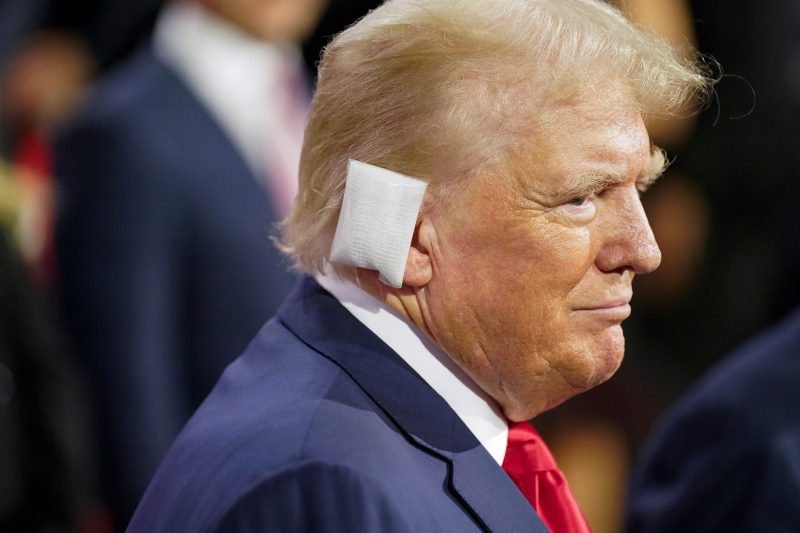Former president Donald Trump was shot in the ear by a bullet or a bullet fragment during the assassination attempt at one of his campaign rallies, the FBI said Friday, responding to an outcry sparked when FBI Director Christopher A. Wray testified Wednesday that the former president and Republican nominee was wounded by either a bullet or shrapnel.
For nearly two weeks, there had been speculation about whether Trump had been grazed by a bullet (or fragments of one) or nicked by other debris during his July 13 campaign rally in which 20-year-old gunman Thomas Matthew Crooks opened fire at Trump and into the crowd in Butler, Pa. Wray maintained in congressional testimony Wednesday that investigators hadn’t reached a definitive conclusion while Trump and his Republican allies insisted he had been shot.
The FBI on Friday said the Republican presidential nominee was hit with a bullet.
“What struck former President Trump in the ear was a bullet, whether whole or fragmented into smaller pieces, fired from the deceased subject’s rifle,” the agency said in a statement.
A Washington Post analysis of photos and videos of the shooting found that former president Trump’s injury appears to be consistent with the attributes of a graze wound from a bullet and not that of bullet fragments, according to two trauma surgeons, Babak Sarani, director of trauma and acute care surgery at George Washington University Hospital, and Joseph Sakran, director of emergency general surgery at Johns Hopkins. The physicians reviewed the Post’s analysis.
“Usually shrapnel flies in random patterns. Because it’s shrapnel, right? It doesn’t go in a straight line. This really looks like a linear laceration is how I would describe,” Sarani told The Post. “So it’s something, it’s going in a straight line which makes you think it’s more the projectile itself, not shrapnel.”
High-velocity rounds, such as those likely fired by Crooks, impart energy, or a blast effect when striking a body. A graze wound like that of the former president would not, Sarani said.
“The bullet literally just grazes you and so very little energy is imparted into you. The rest of it is just dissipated into the air.” he added. “That’s how you, if you are, quote unquote, lucky. The bullet just grazed you.”
Just hours after the assassination attempt, Trump started insisting he had been hit with a bullet.
“I was shot with a bullet that pierced the upper part of my right ear,” he wrote in a Truth Social post that published at 8:42 p.m. on July 13, less than three hours after the shooting. “I knew immediately that something was wrong in that I heard a whizzing sound, shots, and immediately felt the bullet ripping through the skin. Much bleeding took place, so I realized then what was happening.”
Wray testified to the House Judiciary Committee that the exact nature of Trump’s injury remained uncertain. “I think with respect to former president Trump, there’s some question about whether or not it’s a bullet or shrapnel that, you know, hit his ear,” he told lawmakers Wednesday.
Rep. Ronny Jackson (R-Tex.), the former White House doctor who has been monitoring Trump’s health since the assassination attempt, criticized Wray’s comments.
“There is absolutely no evidence that it was anything other than a bullet,” Jackson wrote in an update on Trump’s health. “Congress should correct the record as confirmed by both the hospital and myself. Director Wray is wrong and inappropriate to suggest anything else.”
On Friday, Sen. Lindsey O. Graham (R-S.C.) sent a letter to Wray, urging him to “correct your testimony before Congress on Wednesday when you indicated it is uncertain whether President Donald J. Trump was hit by a bullet, glass, or shrapnel.”
“It is clear to everyone that President Trump survived an assassination attempt by millimeters, as the attempted assassin’s bullet ripped the upper part of his ear,” Graham wrote in a letter that Trump published Friday in a Truth Social post.
It was one of several posts Trump wrote criticizing Wray’s testimony over the past two days.
He posted another late Friday after the release of the FBI statement confirming he had been shot.
“I assume that’s the best apology that we’ll get from Director Wray,” he said of the FBI’s conclusion, “but it is fully accepted!”
